 “And the dishes answered:
“And the dishes answered:
It was bad for us with a woman,
She did not love us,
She beat us, she beat us,
Dust, smoked,
She ruined us! "
K.I. Chukovsky
As you can see, for Fyodora Yegorovna, the fairytale character of Korney Chukovsky, cleaning teapots, pots and pans was not a favorite and pleasant pastime. And if these dishes also require a special approach, such as, for example, enameled dishes, then the task becomes more complicated even for a modern housewife. There are materials that are less capricious and do not require special care. And there are such items in handling which it is better to follow simple rules in order to prolong their life.
Attention! Earned on our website kitchen designer. You can familiarize yourself with it and design your dream kitchen for free! May also come in handy wardrobes designer.

Particularly capricious specimens include enameled dishes. Despite the fact that modern technologies make it possible to produce sufficiently strong alloys from cast iron, aluminum and other metals, the enamel with which they are coated is very easy to damage or even spoil. Pots suffer more often and more strongly than other items. It is they who come under the influence of fruit acids and vegetable natural dyes during the preparation of compotes, borscht, cooking vegetables, and even outside they often get dirty and burn.
What can not be cleaned enameled dishes
You need to clean the enamelware carefully so as not to scratch the enamel. Not only scratches may appear on it, but also microcracks, which will not appear immediately, but over time - in the form of darkened strips clogged with dirt.
So, what can not be used to clean such dishes:
- Metal washcloths;
- Coarse brushes;
- Cleaning agents with coarse abrasives;
- With a knife and other sharp objects.
Cleansing from dark plaque and yellowness of the pan with folk remedies at home
So how do you whiten and restore a pot to its former cleanliness and shine at home? How to get rid of blackness and yellowness? To begin with, consider the methods that our grandmothers and mothers used effectively.
How to wash and clean black with salt
Table salt can be found in any kitchen. It is the only abrasive that can be used to clean enamel cookware. If it is necessary to clean the stubborn dirt, then you can sprinkle salt on the wet dirty surface, leave it for an hour, and then gently wipe it off. No need to take too hard a sponge or brush. Better if it is a tissue flap or rayon napkin.
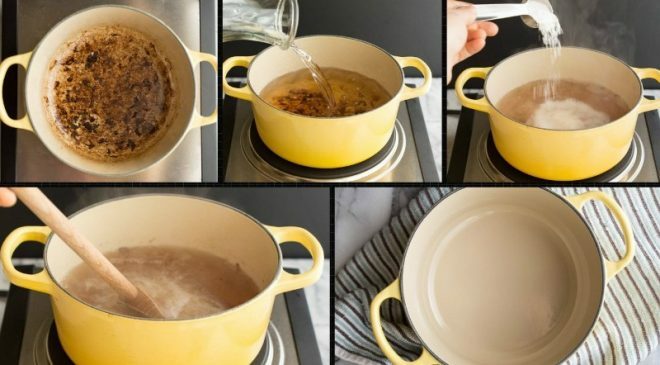
In the case when the dirt is firmly fixed on the enamel, there is burnt or scale, a saturated saline solution is used. Approximate proportions are two or three tablespoons of salt per glass of water. It is necessary to take enough water to cover the pollution, and if it is outside, then immerse the pan in a large container with a solution, boil for about half an hour. Then we clean it with a sponge and rinse everything off with running water.
You can whiten enamel with sand
You can clean enameled dishes with ordinary white sand. It is more convenient to do this on the street. You just need to sand the dirt and rub it with a sponge. The sand should be changed as it gets dirty. After such a procedure, it is necessary to thoroughly wash the dishes with the usual detergent in warm water.
Citric acid cleaning
Citric acid is a good and proven remedy for getting rid of dark stains, burns and limescale from enamel cookware. The procedure is the same as with salt:
- Preparing the solution;
- We fill in the pollution;
- We boil for about half an hour;
- Remove the softened plaque with a sponge;
- We wash the dishes with running water.
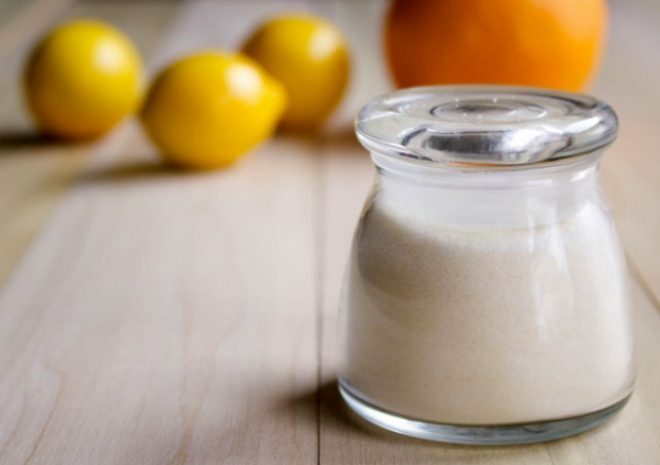
One caveat - we use less citric acid than salt. In a glass of water, you need to dilute one small pack. It is worth noting that lemon juice will not give the desired effect, so it is better to eat the fruit, and buy several small or one large pack of citric acid for cleaning. Its solution acts mildly in relation to enamel, but merciless for scale and remnants of burnt food. Still, it is not advisable to leave the solution in the container for a long time. Acids are capable of destroying enamel with prolonged contact. Therefore, immediately after boiling, rinse with running water.
How to clean with activated carbon
Activated charcoal tablets will help get rid of burning on enamel dishes and wash them. Grind the required amount and fill the carbon deposit with the resulting powder. You need to leave it for 30 minutes, then pour cold water and leave for another hour. After such manipulations, the enamel can be easily cleaned of contamination.

Household products for bleaching enameled dishes inside and out
Today, trade stores offer our attention the widest selection of household chemicals for removal of burnt fat, scale and burning - such unwanted and unsightly companions of enameled utensils. These are gels, powders, foams, pastes, liquids, aerosols. There is a tool for every taste and wallet.
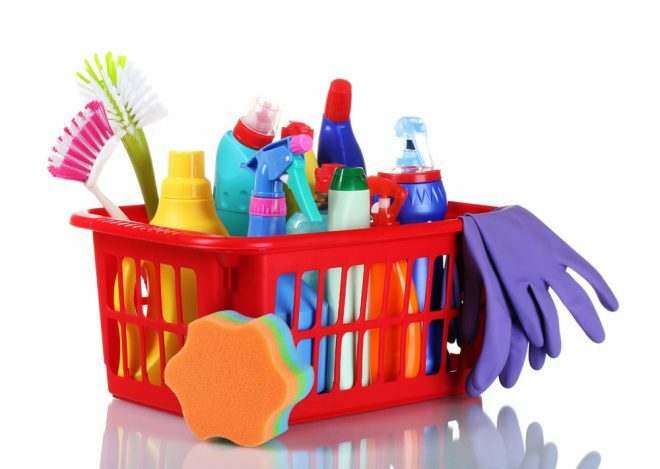
Is everything so simple and unambiguous? Typically, a good and effective chemical is expensive, while a cheap one is either useless or consists of common inexpensive ingredients such as baking soda or salt, but flavored with dyes, flavors, and the like additives. Whichever option you choose, you should remember that they contain poisons - substances that can harm health. Therefore, after using them, you should especially thoroughly rinse the dishes from all sides with warm running water.
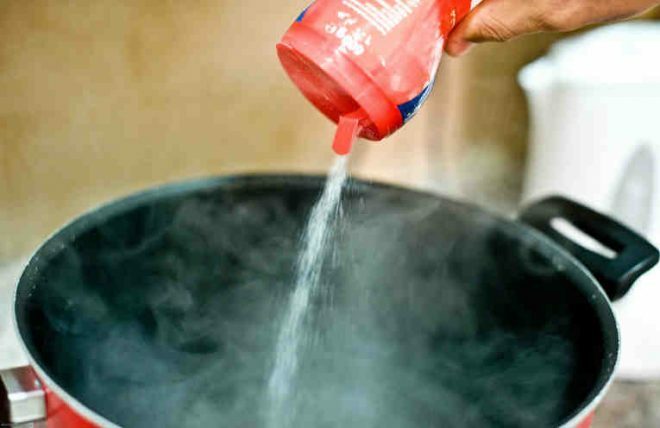
For families with children, it is better to abandon aggressive household chemicals altogether, since its components, in addition to poisoning, they can cause allergic reactions both immediately after use and after some time. The components of household products will dissolve fat, scale, soot and other contaminants faster than folk inventions, but it is worth remembering why this happens. It is necessary to work with them carefully, only with rubber gloves, so as not to damage the skin of the hands.
Prevention, rules for the use and storage of enameled dishes
To extend the service life and maintain a presentable appearance of enameled dishes, you need to remember and follow a number of simple rules for care and use:
- Avoid hitting. A piece of enamel can break off from a blow or fall - in this place the pan will begin to rust, and such utensils can no longer be used for cooking, only for storing dry food.
- Do not knock on the edges with a spoon and do not use metal utensilsso as not to provoke scratches and cracks on the enamel. This will lead to the result described in the previous paragraph.
- If something is burnt in the pan, do not leave pollution for a long time. Remove it as soon as possible, or at least fill it with warm water so that it does not dry out. The more the dirt dries to the enamel, the harder it will be to say goodbye to it.
- Avoid sudden temperature changesfor example, pouring cold water over a hot pot or frying pan. This will have a detrimental effect on the enamel finish.
- Do not place large cookware on the small hotplate.. This is the same temperature drop, only outside.
- If the dirt is too strong, several cleaning methods must be used without using sharp and hard objects.
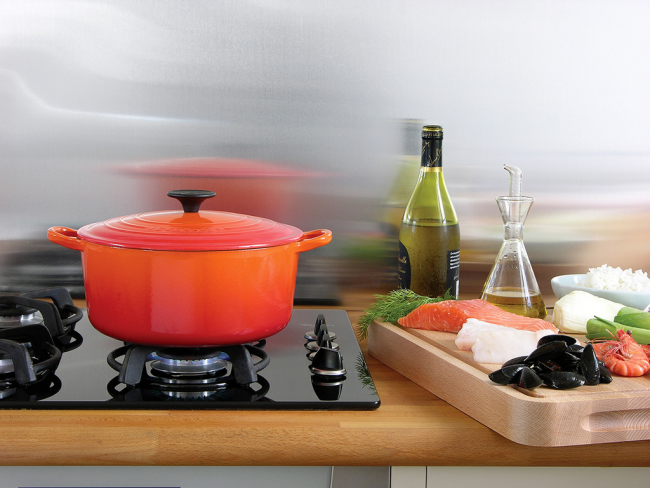
Enameled dishes are beautiful and durable when used with care. Its surface does not contribute to the reproduction of microbes harmful to health and does not react with food, on the contrary - a layer of enamel separates and protects them from the effects of metal alloys. In such a dish, cooked food can be stored for a long time without any harm to human health, without changing its taste.
Video: how to clean an enamel pan
When choosing enamel cookware, give preference to heavier items. The heavier it is, the more evenly it heats up and better withstands overheating, minor impacts. Modern enameled cookware undoubtedly takes its rightful place among the variety of kitchen equipment and furnishings.
average rating 0 / 5. Number of ratings: 0
No ratings yet. Be the first to rate.


